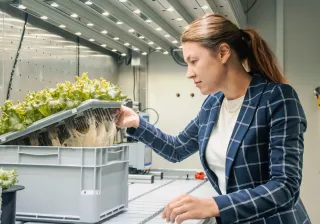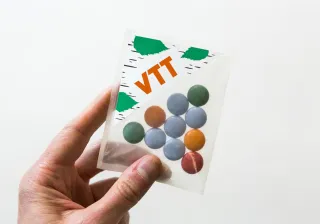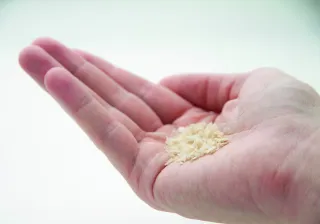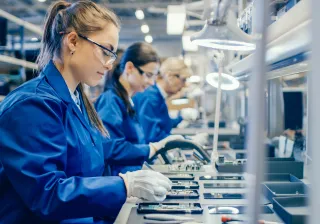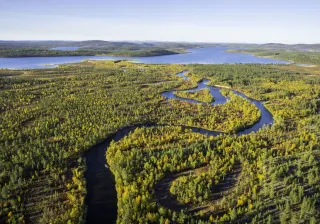Sustainable bio-based materials

Companies are interested in changing their current raw materials into more sustainable ones originating from or inspired by nature. This generates new unpredictable business opportunities, based on sustainable raw materials, production and products.
Key facts
Sustainable bio-based materials are inspired by nature and comply with nature’s circular principles generating no waste.
Experts at VTT have extensive knowledge of nature-based solutions and are able to develop functional, high value-added products based on them.
There are opportunities for businesses to change their current raw materials into bio-based ones as well as generate new business opportunities.

Can you imagine optical fibres made of cellulose? Did you know that spider silk mimicking proteins can be produced in bioreactors? Are you aware that nanocellulose-based membranes can selectively capture microplastics and metals from contaminated waters?
Today the world needs new sustainable solutions to replace the fossil-based materials and ensure healthy solutions for the planet and its people. Sustainable bio-based materials are inspired by nature and adhere to nature’s circular principles: reusing, recycling, and biodegradation without waste generation.
Finland’s large resource of sustainably managed forests are valuable to creating sustainable bio-based solutions. The materials can be designed in a way that they do not contribute to the environmental plastic problem, such as the release of microplastics.
VTT as the designer of future sustainable materials
At VTT we have extensive knowledge of nature-based solutions to develop functional, high value-added products. We can mimic the best qualities of nature: the strength of cellulose fibrils in wood or the toughness of spider silk. The renewable lignocellulosic materials offer possibilities, which are both sustainable and intelligent.
We process natural biomass by mechanical, chemical and enzymatic means depending on the application requirements. For process optimisation and a structural characterisation, we use sophisticated analysis tools. Understanding the structure-property relationship as well as water-fibre interactions is crucial in biodesigning the future sustainable materials.
Webinar recording: Biomaterial innovations for textiles, fashion and medical applications
Our webinar features e.g. how sustainable materials such as spider silk, feather keratin and fungal leather can replace plastic in high-performance applications.
From understanding the phenomena to up-scaling the production
A challenge with bio-based materials is the transfer of a material from the biological water-based system to industrial manufacturing. At VTT, we will start with understanding the basics of molecular interactions of these natural components for example with water. Before production, the materials can be modelled with VTT ProperTune® for a model driven design. The material assembly can then be tested in lab-scale before up-scaling, eventually to pilot scale.
As an example, spider-silk inspired proteins can be used as a toughening matrix in composite fibres. VTT is utilising proprietary biotechnology for developing scalable protein production and tackle current bottlenecks in the manufacturing of protein based materials.
We can mimic the best qualities of nature: the strength of cellulose fibrils in wood or the toughness of spider silk.
Our solutions for clean water and air include for example cellulose-based membranes to capture microplastics and metals and cellulosic yarns to capture hormones from waste waters.
Collaboration with VTT provides opportunities for businesses to change their current raw materials into more sustainable ones originating from or inspired by nature. It will also generate new business opportunities beyond the obvious, which will be based on sustainable production and products. For its partners, VTT offers state-of-the-art research facilities and infrastructure to support the research, as well as its global scientific and industrial connections in the area of sustainable bio-based materials.
Contact us here!
Case: Mirka Ltd - Efficient production concepts for abrasive materials to reduce environmental impacts
A pioneering Finnish company Mirka tested totally new production concepts that involved bionanomaterials to produce lean and durable products. They will reduce waste and fossil-based carbon dioxide emissions.
Benefit
- 60% reduction of greenhouse gas emissions
- Faster, easier and more efficient production with 20 % less waste
- Nanocellulose helps to double the lifespan of abrasive products and reduce applied coating by 2/3

Case: Stora Enso – Brainstorming viable innovations with Impact Hacks
Two successful hackathons, Impact Hacks, produced innovative ideas for future development and helped deepen the collaboration between Stora Enso’s R&D team and VTT’s scientists. The ideas developed have true business potential and several ideas were later developed into projects.
"We wanted ideas that could have a groundbreaking impact in years to come." - Jenny Müller-Wahlman, Director of Group Innovation and R&D, Stora Enso

Towards sustainable electronics
At VTT, our goal is to set a new standard for sustainability in the electronics industry and offer solutions that increase circularity at every stage of the electronics life cycle. Explore:
- Five ways to improve sustainability of electronics
- How to create new business from sustainable electronics?
- How to reduce electronics waste with sustainable printed electronics?



